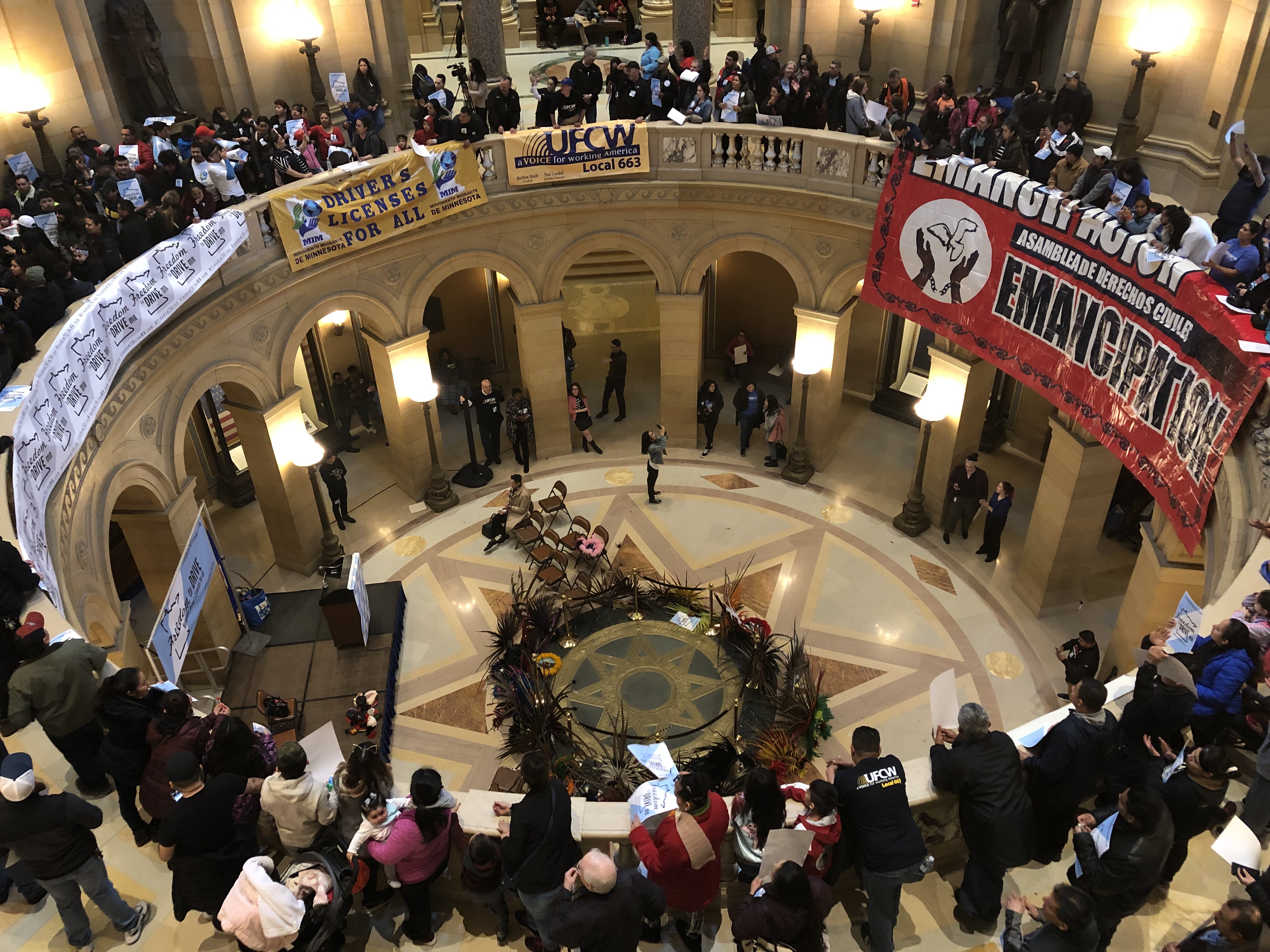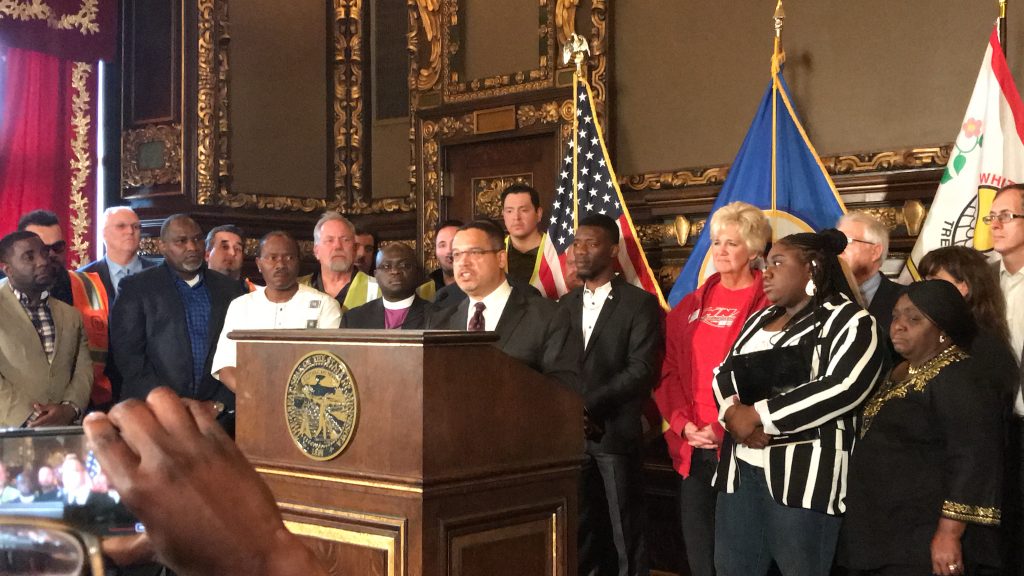Some 13,000 immigrants wait in Mexico, their names on waiting lists to enter the U.S., exposed to violence and homelessness
Archives
In Minnesota counties losing population, immigrants slow the decline
New arrivals are helping slow, halt or even reverse falling census counts in 15 Minnesota counties.
Driver’s Licenses for All: Down to the Finish Line

May 13, 2013—The Minnesota House of Representatives passed Driver’s License for All. Governor Tim Walz supports the legislation. Republicans in the Minnesota Senate are still fighting to block the driver’s license legislation in the final days of the legislative session, as they also try to slash funding for schools, health care, the environment, and more.
Back in 2003, then-Governor, Tim Pawlenty changed the rules and barred the state from issuing driver’s licenses to undocumented immigrants. For the past ten years, impacted community members and advocates have worked to restore driver’s licenses for undocumented immigrants. Twelve states already allow undocumented immigrants to get driver’s licenses, and similar legislation is under consideration in several more states this year. Minnesota’s bill has drawn support from community leaders, agencies and organizations, including the Department of Public Safety, Minnesota Chamber of Commerce, and labor and religious groups.
State law mandates that the legislature finish its business and adjourn by May 20. Major disagreements between the Democratic majority in the House of Representatives and the Republican majority in the Senate make finishing the work unlikely. If the legislature fails to agree on funding bills by May 20, the governor could call a special session, or state government could shut down. The last state government shutdown was in 2011 and lasted for 20 days.
At this stage of the legislative session, conference committees made up of senators and representatives try to negotiate agreement on different bills passed by the two houses. Many of these already-passed bills are combined in omnibus bills. Driver’s Licenses for All is part of the omnibus transportation budget bill (House File 1555) passed by the House of Representatives. Driver’s Licenses for All legislation was also part of end-of-session negotiations in 2013 and 2015.
Trump Wants to Make Asylum Seekers’ Stay in the U.S. Harder—and Shorter
Trump’s proposal calls for charging a fee for asylum applications, stopping work permits for asylum seekers, limiting court hearings.
Civil Servants Say They Are being Used as Pawns in a Dangerous Asylum Program
Asylum officers worry they’re being forced to send some Central Americans to wait in Mexico — even when they’re in danger of persecution there.
Panel talks about racism, discrimination and ignorance
Immigration Delays Create an Invisible Wall
The Trump administration’s anti-immigration strategy includes delay and denial at a rate never before seen.
Freedom to Drive Coalition Statement Following Passage of HF1500 in the Minnesota House
SAINT PAUL — Following the Minnesota House passing HF1500, the driver’s license for all bill, the Freedom to Drive coalition released the following statement:
“We are excited that the Minnesota House has heard the voices of Minnesota families. This unprecedented moment was only possible because of the thousands of Minnesotan families who have been fighting for over a decade to make this happen. We know that driver’s licenses for all means safer families and more prosperous communities. Issuing licenses to undocumented immigrant families is a major step toward recognizing the full dignity of all Minnesotans. We look forward to working with the Senate and Governor Walz and getting this law passed this legislative session.”
BACKGROUND: In 2003, then-Governor, Tim Pawlenty changed the rules and barred the state from issuing driver’s licenses to undocumented immigrants. For the past ten years, impacted community members and advocates have worked to restore driver’s licenses for undocumented immigrants. This year’s effort is backed by a coalition of non-profit organizations, unions, immigrants’ rights advocates, community-based groups and collectives, faith-based organizations, workers’ rights advocates and businesses led by the Multiracial Coalition on Immigration.
###
Full List of Freedom To Drive Coalition Members
Accountability in Action (St Cloud)
ACLU
Advocates for Human Rights
Asamblea de Derechos Civiles
Asian American Organizing Project
Black Immigrant Collective
CAIR-Mn
Citlalcoatl
City of Mpls, Office of Immigrant and Refugee Affairs
City of St Paul Mayor Carter’s office
Club Cuernavaca
COPAL
CTUL
De Leon & Nestor, LLC
Education Minnesota
Hunddle for Action, Annandale (St Cloud)
Immigrant Law Center of Minnesota (ILCM)
Immigrant Movement for Justice
Indigenous Roots
Inquilinxs
Interfaith Coalition on Immigration (ICOM)
ISAIAH
Jewish Community Action
Kalpulli Elohuayotl Mitotiani
Kalpulli KetzalCoatlicue
Kalpulli Yaocenoxtli
KetzalCoatlicue
LCD SPPS
LOVE HOPE RISE
MIM
Minneapolis Regional Labor Federation
Minnesota Budget Project
Minnesota Nurses Association
MIRAC
MN AFL-CIO
MN Council on Latino Affairs
Morena Minnesota
NAPAWF (St Cloud)
Navigate Mn/ Unidos MN
Organization
Peace Unite Church of Christ (St Cloud)
Proyecto Latino
Release Mn 8
Rice County Neighbors United
SEIU- local 26
SEIU- State Council
Sembrando Poder
Social Concerns, Caridades Catolicas (St Cloud)
Unite Here! Local 17
United Food and Commercial Workers (UFCW) 663
University of Minnesota Legal Clinic
Vecinos Sur del Rio
Vecinos Unidos Rochester
Voices for Racial Justice
Women’s March Minnesota
Facts About Family-Based Immigration
(For printable PDF of this Fact Sheet, click here.)
Family Reunification is a Key Principle of Immigration Law
- Immigration policy emphasizes four major principles: 1) family reunification, 2) skills-based immigration, 3) refugee protection and 4) country of origin diversity.
- Family reunification has been a key immigration policy since the late 1800s. In the 1920s, nativist prejudices changed the law to require national origins quotas, drastically reducing levels of immigration into the United States.
- In 1965, Congress passed the Immigration and Nationality Act (INA), which made changes to immigration based on employment quotas and national origins quotas, and put in place a system of immigration which favored family reunification. The Act granted 74 percent of all permanent visas to family reunification categories.
- The changes enacted in the 1965 INA resulted in a more diverse group of nationalities immigrating to the United States. In recent years, Mexico, the Philippines, China, India and the Dominican Republic have sent the largest number of immigrants based on family reunification.
How Family-Based Immigration Works
- Each year, the U.S. government issues 480,000 family-based visas.
- There is no limit to the number of visas issued to immediate relatives of U,S. citizens who are over 21. “Immediate relatives” of U.S. citizens are spouses, unmarried children under 21, and parents. The number of visas granted to immediate relatives of U.S. citizens is subtracted from the overall 480,000 family-based quota.
- To ensure that all family-based visas are not used by immediate relatives of U.S. citizens, Congress sets a minimum number (usually 226,000) that must be allotted through other family-based preference categories. Other family preferences include unmarried adult children of U.S. citizens, spouses and children under 21 and unmarried adult children of permanent residents, married children of U.S. citizens, and brothers and sisters of adult U.S. citizens.
- S. citizens and legal permanent residents cannot sponsor other family members such as grandparents, cousins, uncles, or other extended family members. These limits and the long wait times disprove the “chain migration” myth.
- The law also prohibits any single country from receiving more than 7 percent of the total number of visas issued in a single year.
- Family-based immigration currently makes up two-thirds of all legal permanent immigration. Each year, the number of family members petitioning for lawful permanent resident status exceeds the total number of family visas set by the 1965 INA. Wait times for available family-based visas can extend for years, particularly for persons from countries with many petitioners, such as India, China, Mexico and the Philippines.
- The visa queue has grown to approximately 4 million persons who qualify as family-based immigrants but who must continue to wait. As of January 2019, some visa petitions for relatives from the Philippines and Mexico have been waiting for 23-24 years.
Why Maintaining Family-Based Immigration is Important
- Reuniting families is not only humane, but also recognizes that for many people, families are a source of emotional and economic support contributing to stability and stronger communities.
- Having strong family support networks increases the odds of immigrants and their U.S.-born children reaching their highest potential.
- According to the National Immigration Forum, the percentage of new businesses started by immigrants went from 13.3 percent in 1997 to 28.5 percent in 2014. New immigrants revitalize rural areas and cities such as Boston, Detroit, and Baltimore and have been crucial to technological success stories in Silicon Valley and across the country.
Deferred Enforced Departure (DED) for Liberians Extended
On March 28, 2019, the Trump administration announced it would extend Deferred Enforced Departure (DED) for one more year.
Liberian refugees fleeing Liberia’s civil war were first authorized to stay in the United States in 1991 under Temporary Protected Status (TPS) through President George H.W. Bush. In 2007, President George W. Bush continued the protection of Liberians in the United States by implementing DED. Initially intended to last 18 months, extensions of DED continued for eligible Liberians until March 31, 2018 when the Trump administration decided DED was no longer necessary. The wind-down period was to last a year and DED would officially end on March 31, 2019.
Isabella Wreh-Fofana said she screamed with joy when she heard the news, and then proceeded to call everyone she knew. At the press conference planned in defense of DED, she stated, “I’m grateful for the extension, but we need a permanent solution.”
Furthering Isabella’s message, Minnesota House Speaker Melissa Hortman said:
“We can’t have families keep returning to this place of extreme stress and wondering what the future will hold. Liberians protected under DED need an opportunity to apply for permanent residency. We talk a lot about Minnesota values, and this is part of that. In Minnesota we care about our neighbors, and our Liberian neighbors are Minnesotans. We are going to continue to stand with them.”
Minnesota Attorney General Keith Ellison, who has been a key figure in the support of a lawsuit by Liberians, said, “Making people ride this roller-coaster year after year is inhumane, hurts families and wreaks havoc on our economy and communities. It’s no way for any Minnesotan to live.” He went on to highlight how integral the Liberian community is in Minnesota’s healthcare system.
While DED status for Liberians is extended automatically through March 30, 2020, employment authorization (EAD) was only extended through September 27, 2019. Anyone who may continue working during all or part of the full 12 month DED extension needs to file a new I-765, and should see an immigration attorney.







